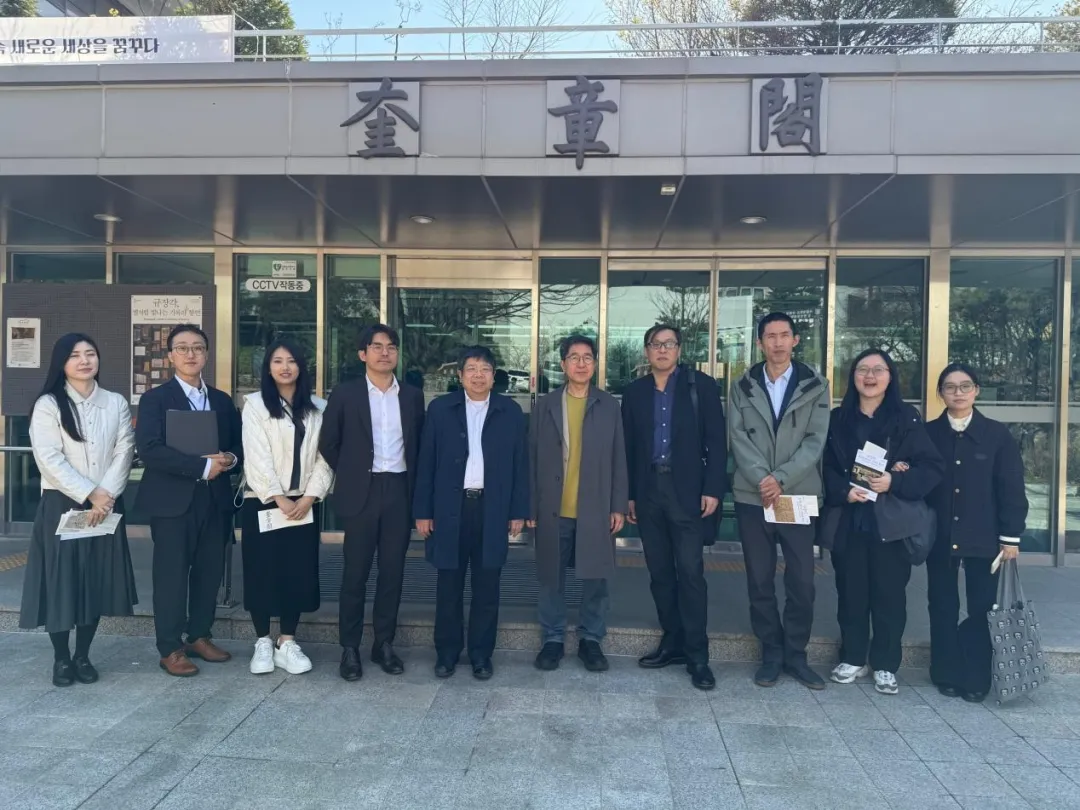A Delegation of School of Philosophy at Renmin University of China Visits Philosophy Departments and Confucianism Research Institutes in South Korean Universities
Jun 10 , 2025From March 24-28, 2025, the delegation of the School of Philosophy visited Chey Institute for Advanced Studies, Academy of East Asian Studies, College of Confucian Studies, Eastern Philosophy and Korean Philosophy, Daedong Institute for Korean Studies, and Institute of Confucian Philosophy and Culture of Sungkyunkwan University,Department of Philosophy and Institute of Philosophical Research of Seoul National University, and The Toegye Studies Institute, to discuss the compilation cooperation and research of International Confucian Canon and reached a general consensus on the topics related to the “International Confucianism Forum·2026”, in an effort to promote academic dialogues and common development in the fields of philosophy and Confucianism between China and South Korea.
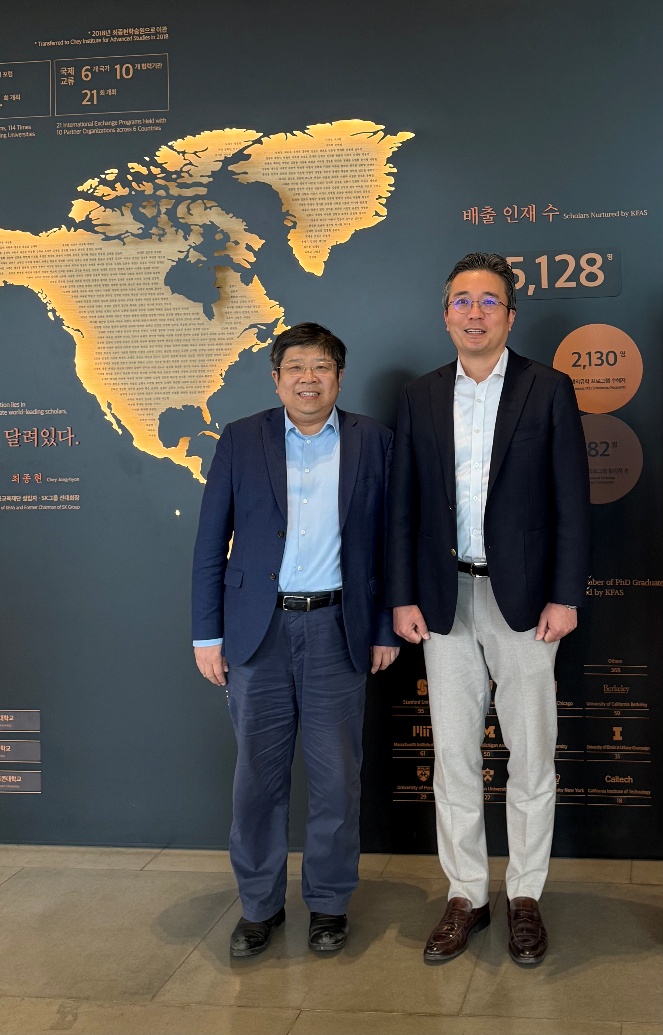
On the morning of March 25, a delegation led by Dean Zang Fengyu visited Chey Institute for Advanced Studies. The delegation expressed gratitude for its long-term support in organizing the "International Confucianism Forum" and engaged in discussions with Dean Kim Yoosuk on further collaborative initiatives in the field of Confucian studies. Dean Kim Yoosuk noted that the "International Confucianism Forum" serves as a pivotal academic exchange platform co-established by Chey Institute for Advanced Studies and Renmin University of China. He emphasized the hope that the next forum will maintain its traditional strengths in academic authority, depth of topics, and broad participation, uphold its high-standard and high-quality organizational principles, and incorporate forward-looking, contemporary themes such as "Science and Technology in Relation to Confucianism" and "AI Applications and Human Civilization." Dean Zang Fengyu highlighted the profound significance of the "International Confucianism Forum" in advancing Confucian studies and dissemination. He proposed expanding academic cooperation resources and introducing topics that reflect pressing contemporary concerns, such as exploring the innovative integration of artificial intelligence and Confucianism. These efforts, he stated, would inject new vitality into the inheritance and innovation of Confucianism in the modern era and further enhance the forum’s global influence and leadership within Confucian scholarship.
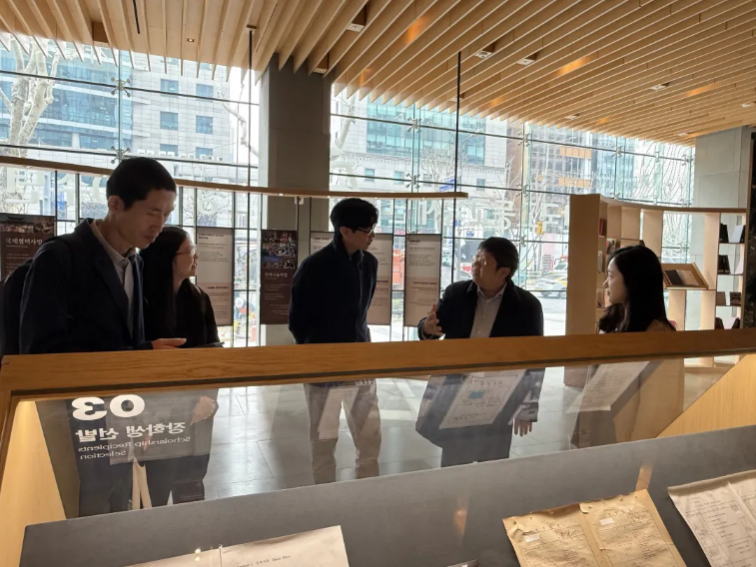
Yoon Jong-hyun, team leader of the International Academic Division at Chey Institute for Advanced Studies, introduced the institute’s recent major academic activities and accompanied the delegation on a tour of 50th Anniversary Exhibition of the institute. During the visit, he detailed the academy’s developmental history and global projects.
On the afternoon of March 25, the delegation visited Sungkyunkwan University and had academic discussions with Professor Kim Kyungho(Dean of the Academy of East Asian Studies), Professor Kim Dongmin(Head of College of Confucian Studies, Eastern Philosophy and Korean Philosophy), Professor Kim Doil(Director of Institute of Confucian Philosophy and Culture), Professor Lee Yeong-ho (Director of Daedong Institute for Korean Studies), and Professor Lee Cheon-seung(President of the Korean Zhuzi Studies Association), etc, and signed the “MEMORANDUM OF UNDERSTANDING BETWEEN THE DEPARTMENT OF CONFUCIAN STUDIES, EASTERN PHILOSOPHY, AND KOREAN PHILOSOPHY AND THE INSTITUTE OF CONFUCIAN PHILOSOPHY AND CULTURE, SUNGKYUNKWAN UNIVERSITY AND SCHOOL OF PHILOSOPHY, RENMIN UNIVERSITY OF CHINA”.
Professor Kim Doildelivered a welcome speech. He emphasized that the Institute of Philosophy and Confucianism at Sungkyunkwan University and the School of Philosophy of Renmin University of China share a lot of resources in philosophy and culture, and it is especially important to deepen the academic cooperation between the two institutions. It is hoped that both sides will better explore ways to intergrate tradition with modernity, promote more in-depth academic exchanges in the field of Confucianism and culture, and jointly explore the future development of philosophy.
Professor Kim Kyungho introduced the development history of the Academy of East Asian Studies. He pointed out that the School of Philosophy of Renmin University of China and Academy of East Asian Studies of Sungkyunkwan University, College of Confucian Studies, Eastern Philosophy and Korean Philosophy, Institute of Confucian Philosophy and Cultureand the Daedong Institute for Korean Studies of Sungkyunkwan University are important academic institutions specializing in the study of East Asian philosophy and Confucianism. This meeting is not only an opportunity for academic exchanges, but also lays the foundation for future in-depth cooperation. Both sides are expected to jointly promote the development of East Asian philosophy and explore ways to apply Confucianism to modern society.
Professor Kim Dongmin stated in his address that the current landscape of humanities is witnessing increasingly intense intellectual debates. He noted that while many perceive East Asian philosophy as confined to historical traditions, it has in fact continuously evolved and adapted to the needs of modern society. As a foundational figure of East Asian philosophy, Confucius, despite confronting immense challenges in his era, remained focused on fundamental questions of human existence. Later, Zhu Xi further conducted profound explorations into human nature and societal development. The legacy of these philosophical traditions endows contemporary East Asian philosophy with enduring relevance. Dean Kim expressed his anticipation to collaborate with the School of Philosophy of Renmin University of China in ushering in a new chapter for East Asian philosophical research.
Dean Zang Fengyu expressed gratitude for the invitation extended by the Academy of East Asian Studies,College of Confucian Studies and Eastern Philosophy,the Institute of Eastern Philosophy and Culture, and the Institute of Confucian and Cultural Studies at Sungkyunkwan University .He outlined the development history, disciplinary construction, talent cultivation, and international exchanges, and other aspects of the School of Philosophy of Renmin University of China. He also expressed his expectations for collaboration with the relevant departments and research institutions of the philosophy at Sungkyunkwan University. Dean Zang noted that previous interactions with Confucian scholars from Sungkyunkwan University at the "International Confucianism Forum" had laid the foundation for deeper explorations of Confucianism's value in multicultural civilizational development. He proposed strengthening cooperation with the Institute of Eastern philosophy and Culture in areas such as the compilation of the International Confucian Canon .Today's academic seminar and the cooperation to be carried out in the future will open a new chapter for further exchanges between the two sides and contribute to the enhancement of Asian philosophy and Confucian studies.
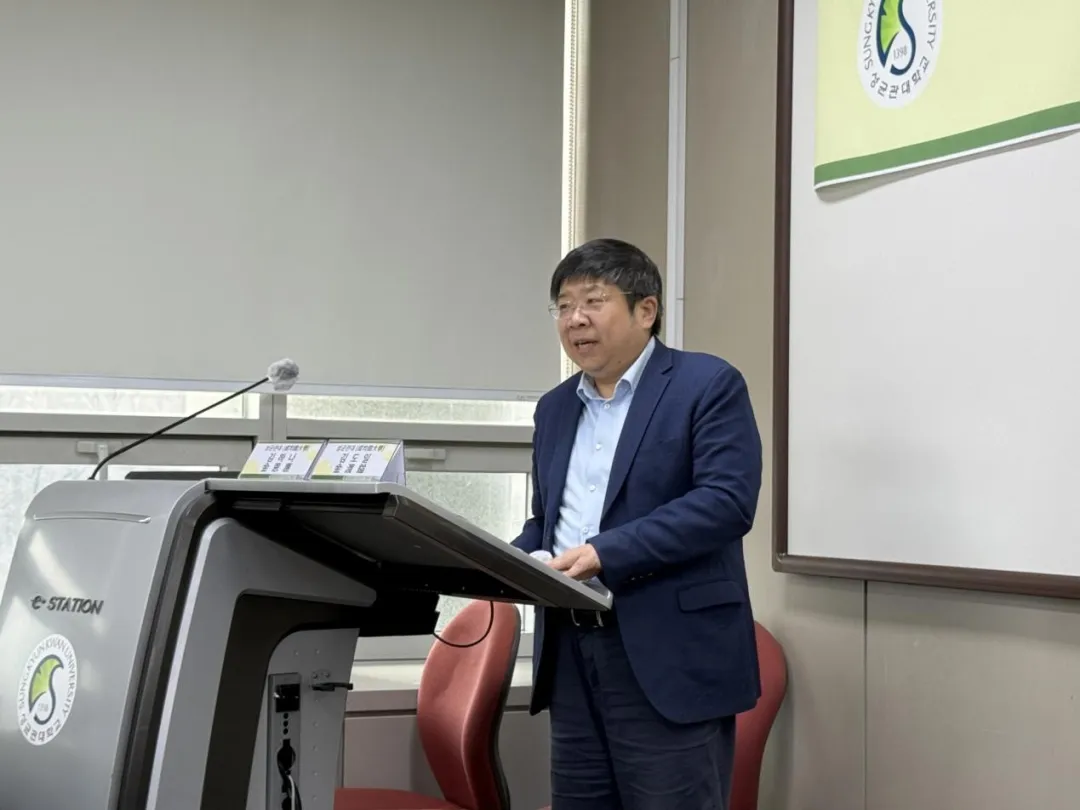
Subsequently, Dean Zang Fengyu from Institute of Confucian Philosophy and Culture of Sungkyunkwan Universitydelivered an academic lecture titled "The Practical Philosophy Characteristics of Yangming's Theory of Mind". Researcher Hong Lin from the Institute of Confucian Philosophy and Culture Contents presented an academic report entitled "Methodology and Orientation in Reconstructing Contemporary Confucianism: The Korean Context".Professor Liu Zengguang from the School of Philosophy at Renmin University of China introduced the digital transcription and preliminary collation of the first three volumes of documents by the compilation team of "The Confucian Canon of South Korea: The Five Classics Section, Documents of the Book of Rites Category." He expressed the hope that the Institute of Eastern philosophy and Culture of Sungkyunkwan Universitycould provide support in aspects such as providing rare editions, academic peer review, and academic exchanges.The session concluded with a spirited discussion among participating scholars, fostering substantive intellectual dialogue.
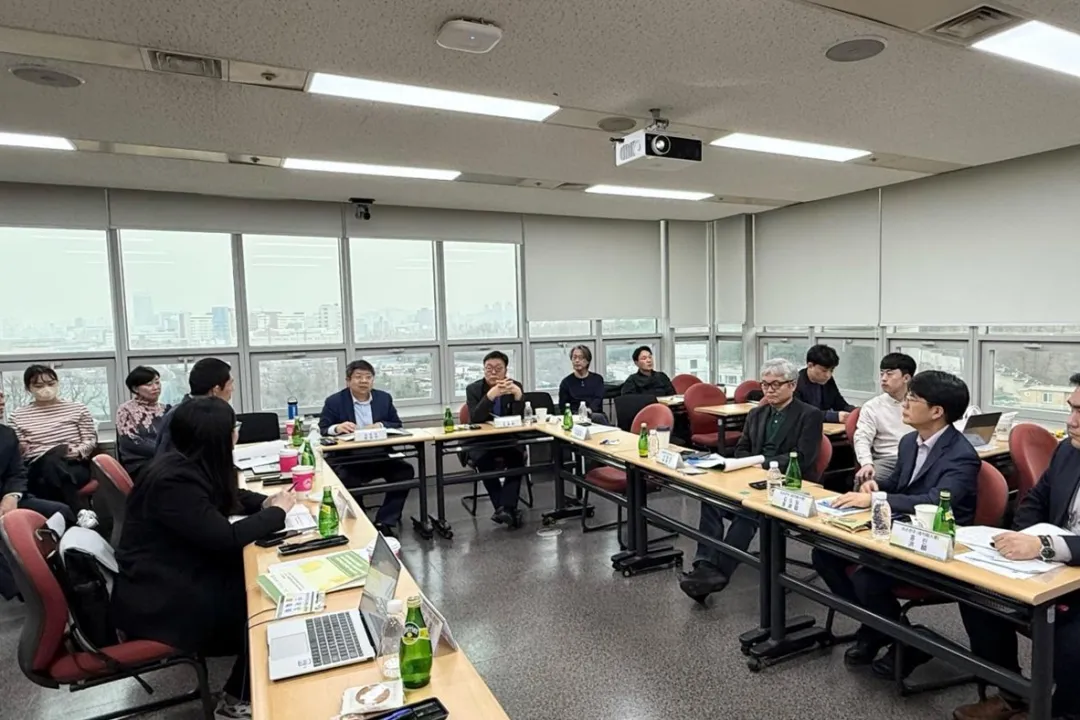
After the academic exchange session, Dean Zang Fengyu signed the Memorandum of Cooperation with Professor Kim Dong Min of theCollege of Confucian Studies and Eastern Philosophy of Sungkyunkwan Universityand Director Kim Doil of the Institute of Confucian and Cultural StudiesInstitute of Confucian Philosophy and Culture of Sungkyunkwan University .
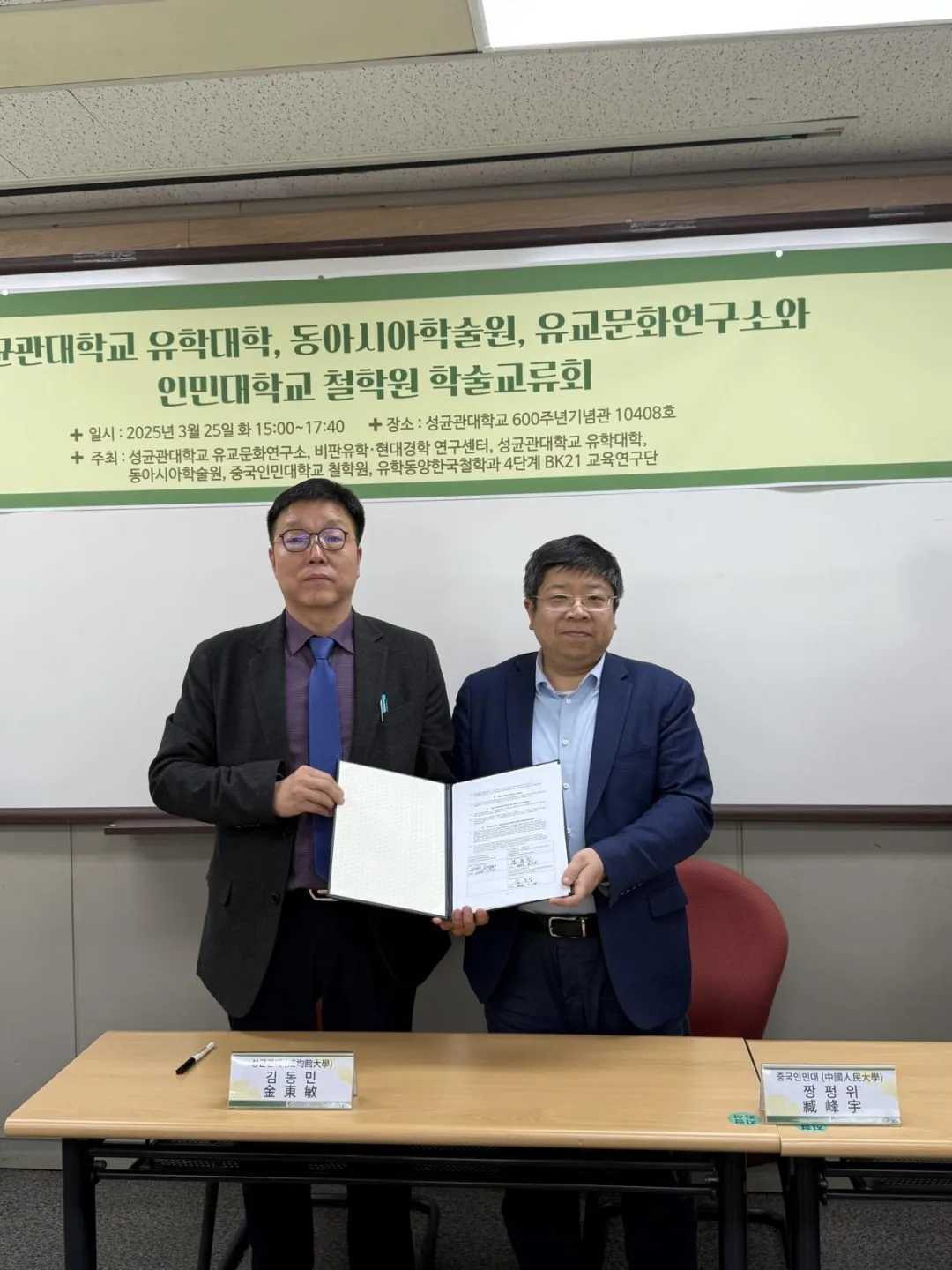
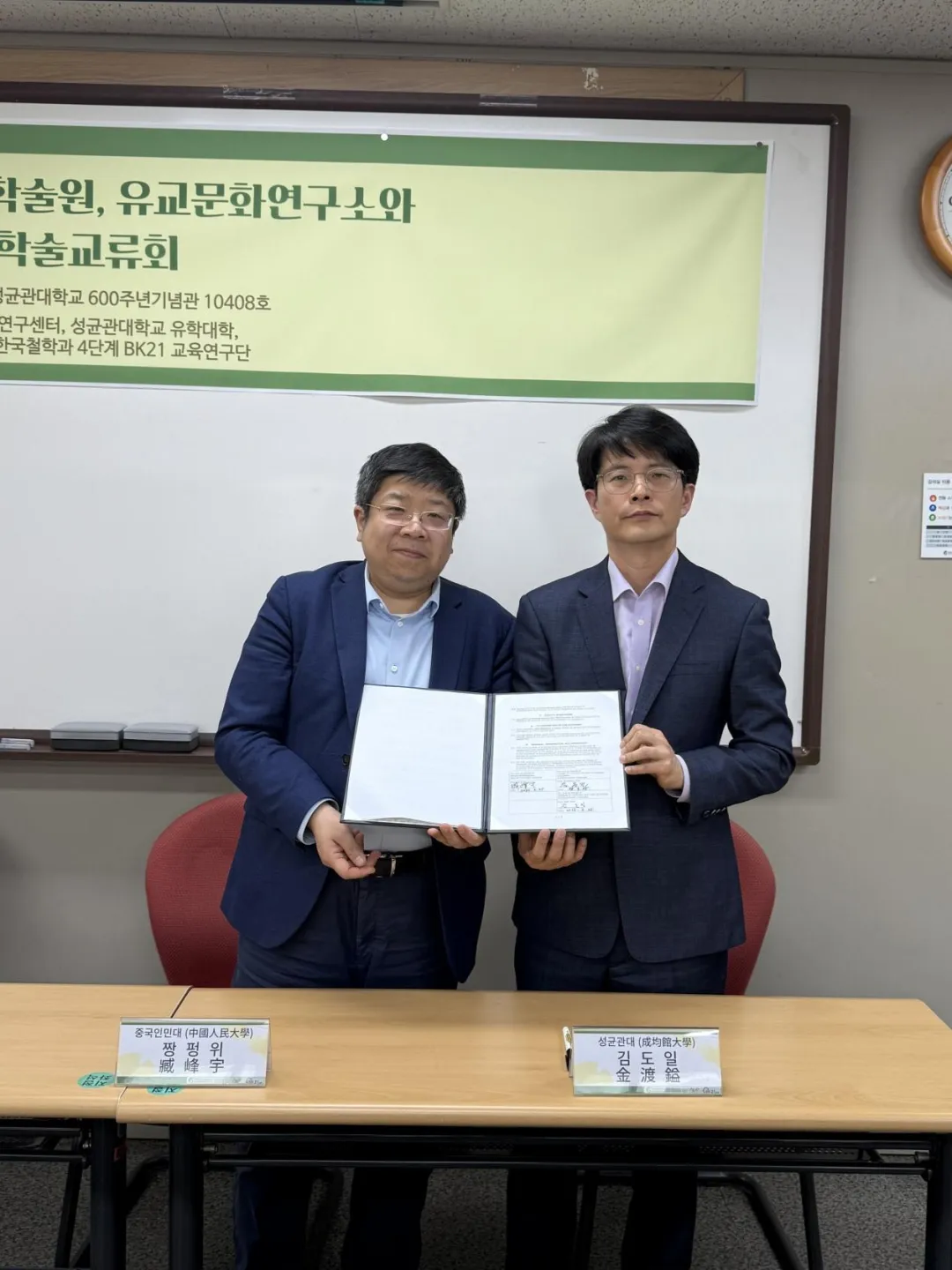
Director Lee Yeong-ho of the Institute of Eastern philosophy and Culture of Sungkyunkwan University delivered a concluding speech. He pointed out that this conference had opened a new chapter in cooperation between the Institute of Confucian Philosophy and Culture Contents of Sungkyunkwan University and the School of Philosophy at Renmin University of China. "The Confucian Canon of South Korea: The Five Classics Section, Documents of the Book of Rites Category" reflects the outstanding achievements of Korean Confucianism in the field of ritual studies, It demonstrates the profound insights of Korean Confucian scholars regarding the ritual systems, social ethics, and cultural heritage, and it is an important documentary resource. The Institute of Eastern philosophy and Culture will provide support to the compilation team of the School of Philosophy at Renmin University of China as much as possible.
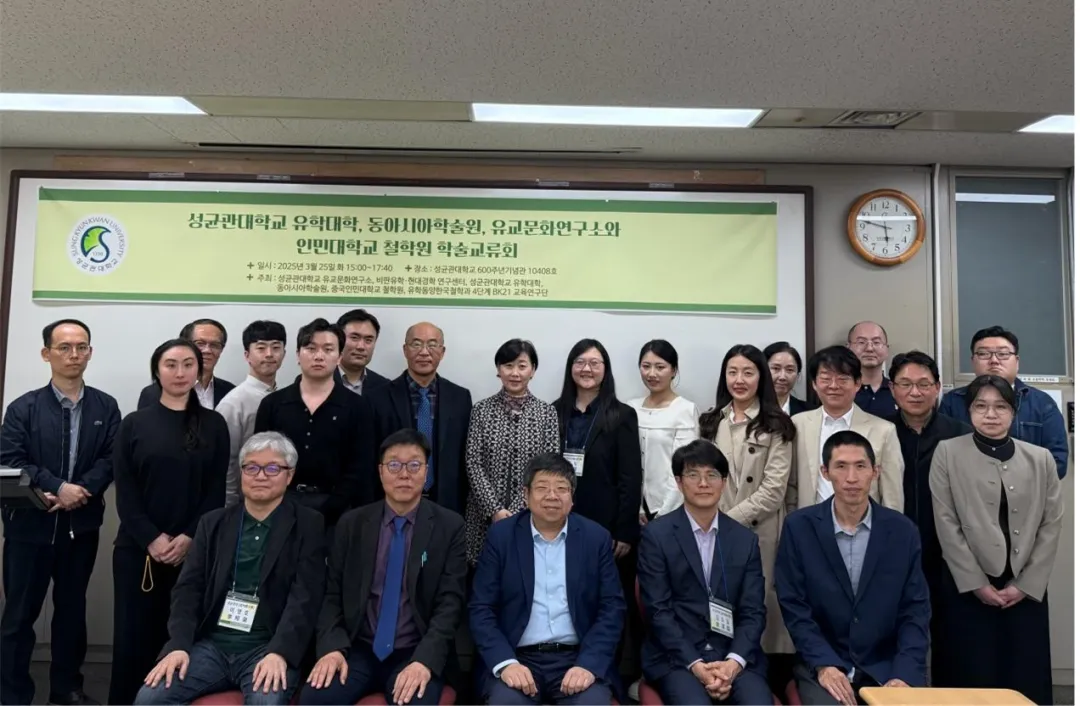
On March 26, the delegation visited the Toegye Studies Institute. They held in-depth academic discussions with Professor Lee Gwang-ho , Dean of the Toegye Studies Institute; Professor Kim Eon-jong, Dean of the Korean Classics Translation Institute ; Professor Ahn Byeong-gol, Deputy Dean of the Toegye Studies Institute; and Professor Lee Jae-gap, Secretary General of the International Toegye Studies Association . The discussions focused on topics such as “Perspectives on Contemporary Social Development from the Viewpoint of Toegye Studies "and"Research on the Compilation of the International Confucian Canon"
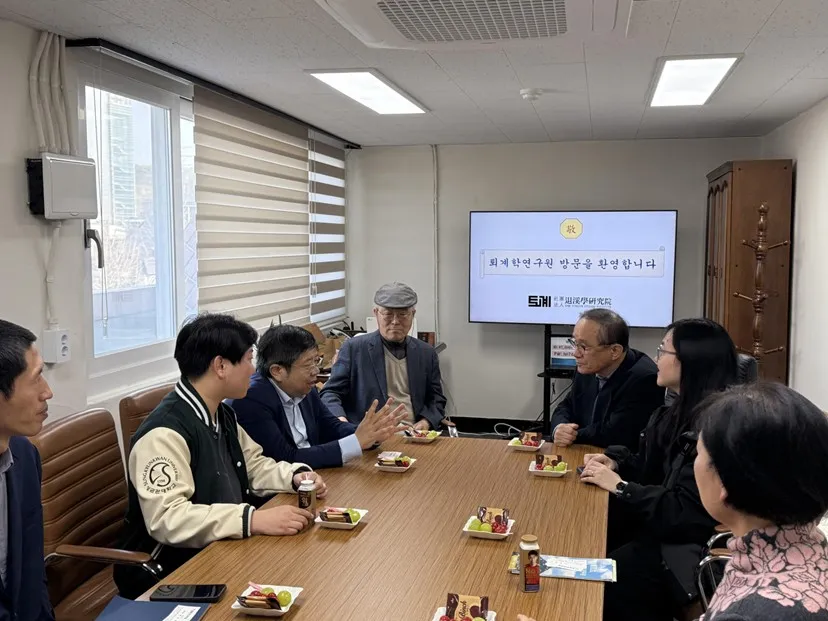
Dean Zang Fengyu stated that in the field of East Asian philosophical thought, South Korean Toegye Studies , as a distinctive branch within the developmental trajectory of traditional Confucianism, has garnered academic attention in recent years. The School of Philosophy at Renmin University of China and South Korean Toegye Studies Institute share a long-standing foundation of academic collaboration. The renowned philosopher Zhang Liwen has conducted profound research on the philosophical ideas of Toegye, authoring works such as Studies on Yi Toegye's Thought, A Comparative Study of Zhu Xi and Toegye's Philosophies, and The World of Yi Toegye’s Thought. Conducting thorough analysis and research on Toegye studies, and exploring these ideas within the context of modern social development, plays a vital role in our comprehensive understanding of the value of excellent traditional culture. It is hoped that more profound cooperation and exchanges can be pursued with the Toegye Studies Institute in the future.
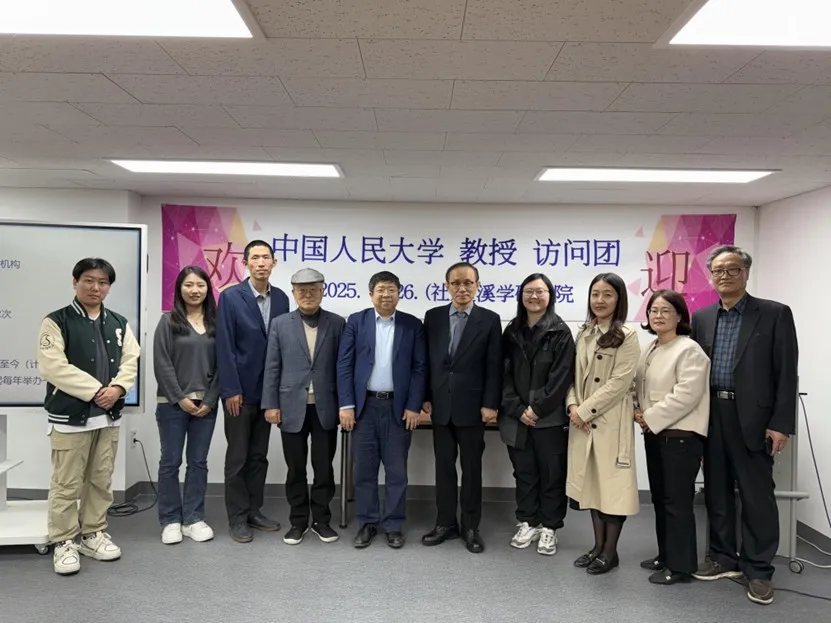
Secretary General Lee Jae-gap provided the delegation with a comprehensive overview of the Toegye Studies Institute, the International Toegye Studies Association, and the Toegye Studies Promotion Association. He emphasized that Toegye Studies, centered on the ideological system of Li Toegye—the renowned ancient Korea Confucian scholar—has been deeply rooted in South Korea's historical and cultural soil through centuries of inheritance and evolution. It has exerted a profound and enduring influence on various aspects of South Korean society, including its social system, ethical norms, and cultural-artistic expressions. Secretary General Lee expressed hope for further collaboration with the School of Philosophy at Renmin University of China to jointly explore pathways for Toegye Studies to achieve create new transformations and foster innovative developments, enabling its continued relevance and active contribution to modern society.
After the discussion , a book exchange ceremony was held. The delegation from the School of Philosophy presented the Toegye Studies Institute with 27 volumes of works published or edited by Mr. Zhang Liwen since 2006. In return, the Toegye Studies Institute presented to the School of Philosophy at Renmin University of China with the latest editions ofToegye's Complete Works and the Journal of Toegye Studies.
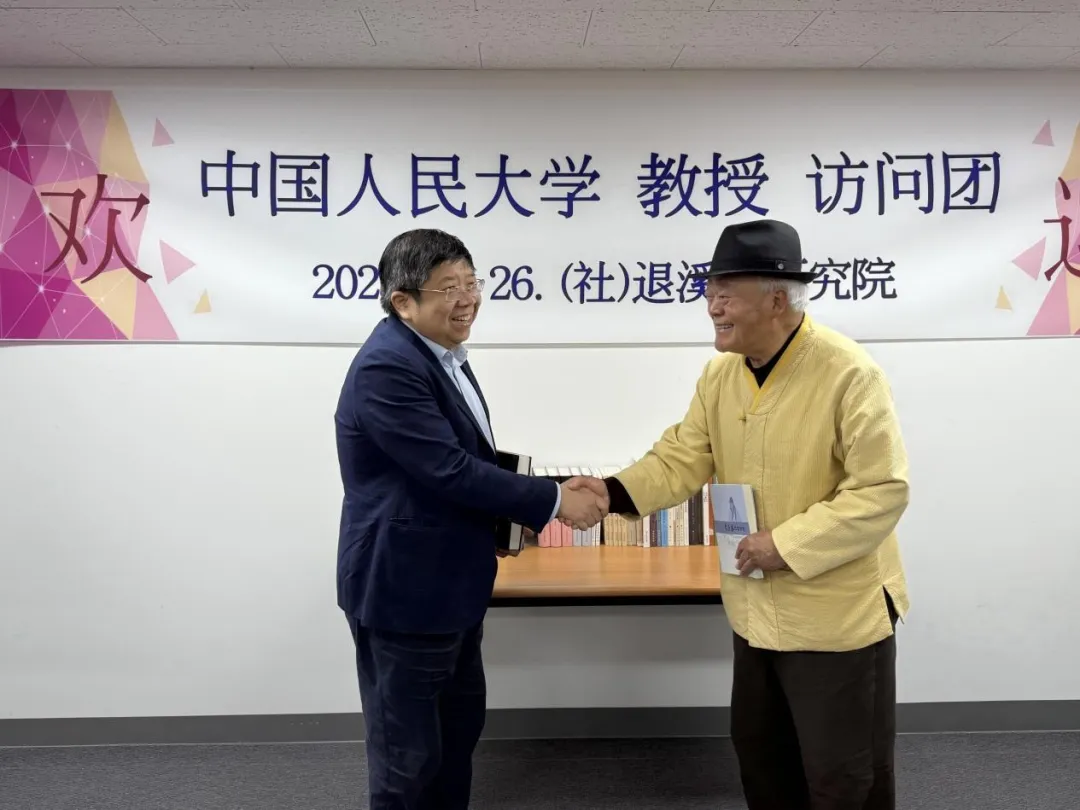
On March 27, the delegation from the School of Philosophy visited the Korean Institute of Philosophy and Human Culture, engaging in an in-depth discussion with Professor Emeritus Choi Young-jin of Sungkyunkwan University on "the Development and Key Subject of Korean Neo-Confucianism ". Professor Choi systematically elaborated on the core concepts of Korean Neo-Confucianism, the classification of schools within its developmental trajectory, and its fundamental challenges. Subsequently, The delegation also visited the Paju Cultural Institute, where they joined Director Park Jae-hong in a detailed discussion about the life and philosophy of Yulgok , who, alongside Toegye , is regarded as one of the "two pillars of Korean Confucianism." The discussion covered Yulgok’s historical legacy, the remains of his academy, and related historical texts and documents.
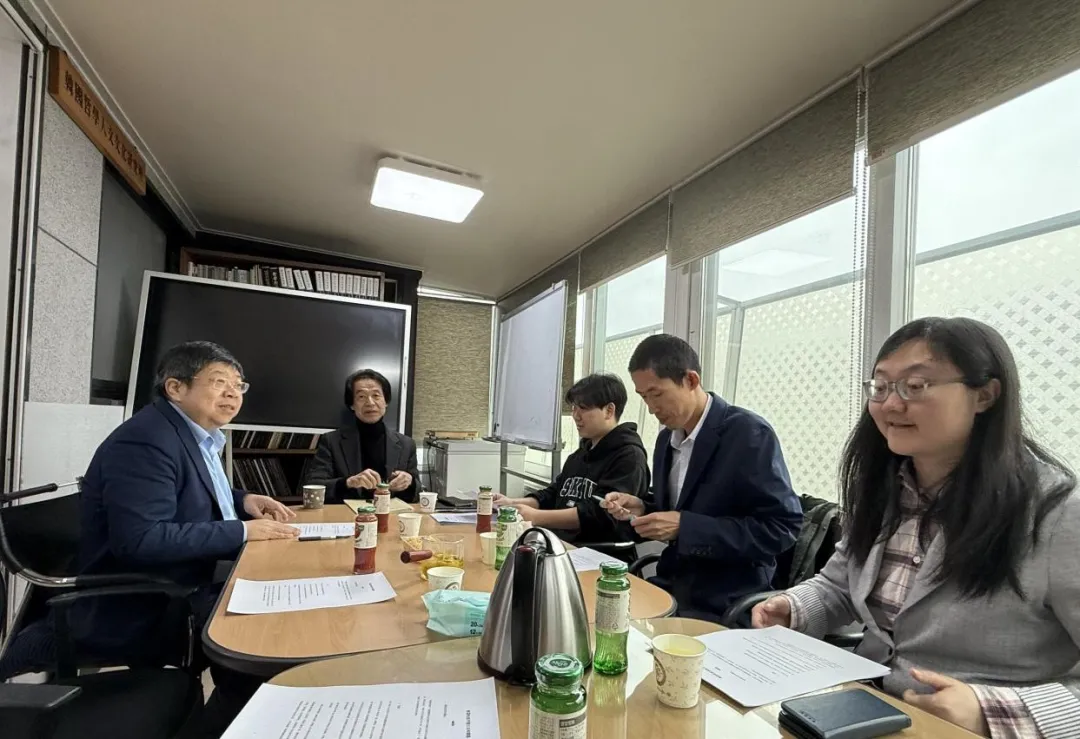
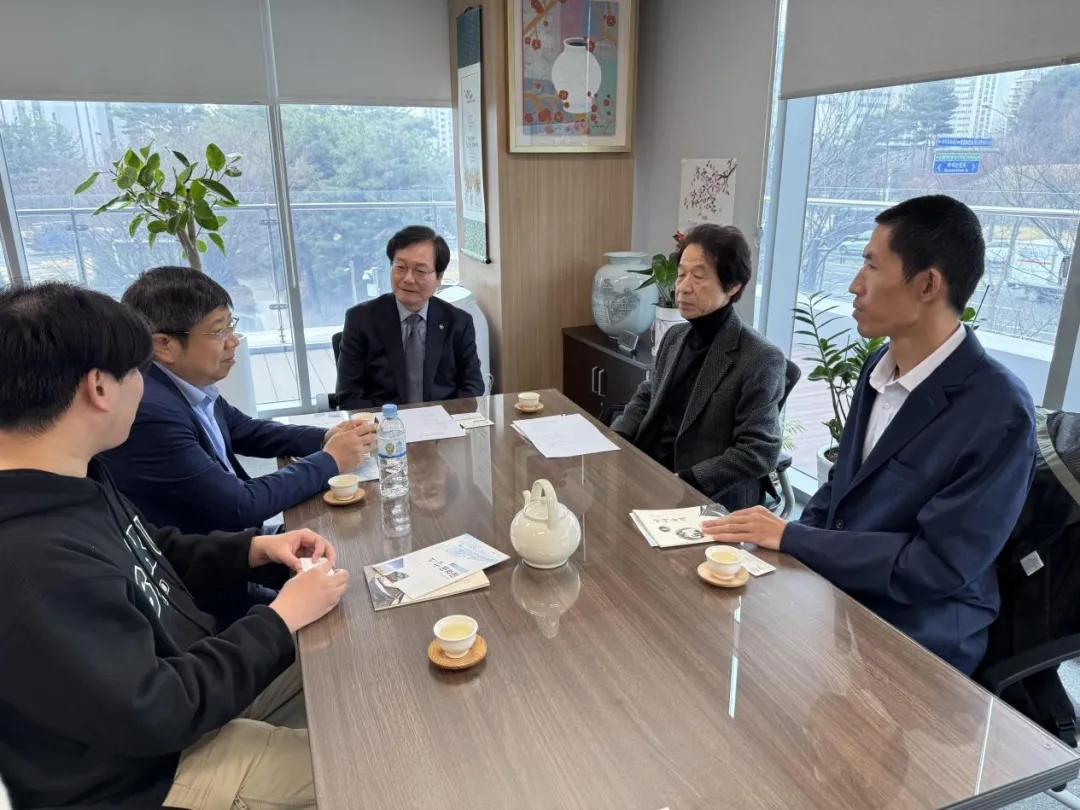
On the morning of March 28, the delegation from the School of Philosophy engaged in thorough discussions with Professor Jeong Weon-Jae, Director of the Department of Philosophyof Seoul National University, Chang Won-Tae, Director of the Institute of Philosophical Thought of Seoul National University, and other professors including Professor Guo Yi; and Professor Lee Sangyop. The professors from Seoul National University’s Department of Philosophy spoke highly of the International Confucianism Forum hosted by Renmin University of China in 2024 and extended a warm welcome to the delegation. Professor Chang Won-Tae provided a detailed introduction to the history , curriculum, and talent cultivation programs of the Department of Philosophy at Seoul National University.
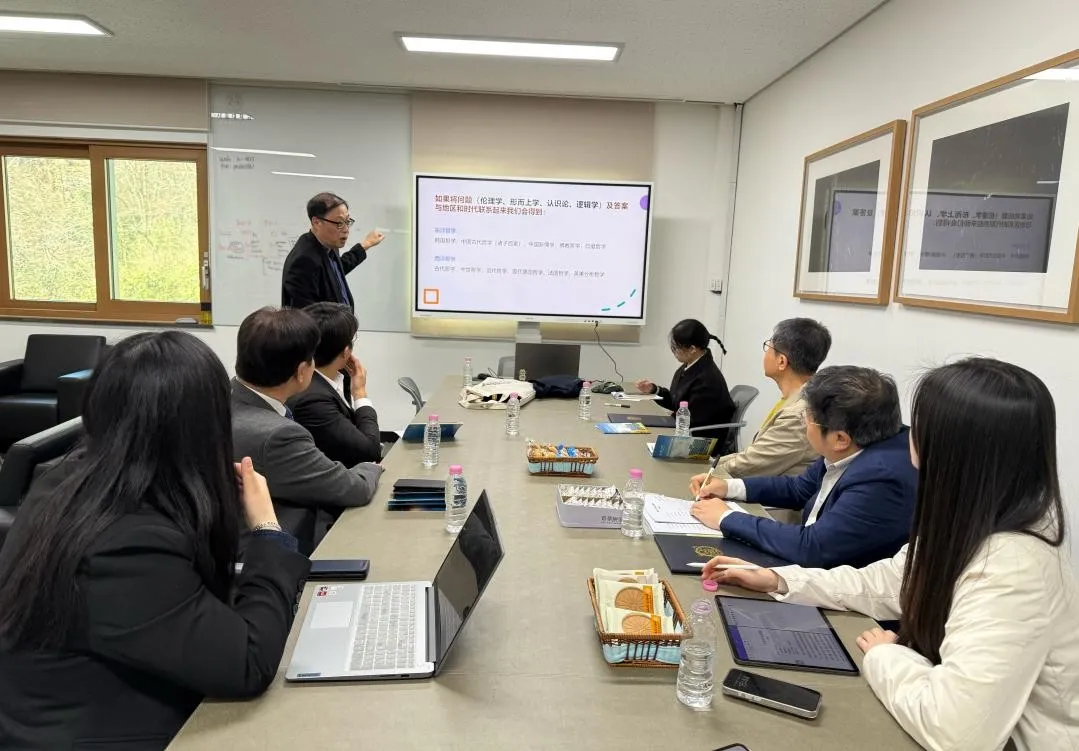
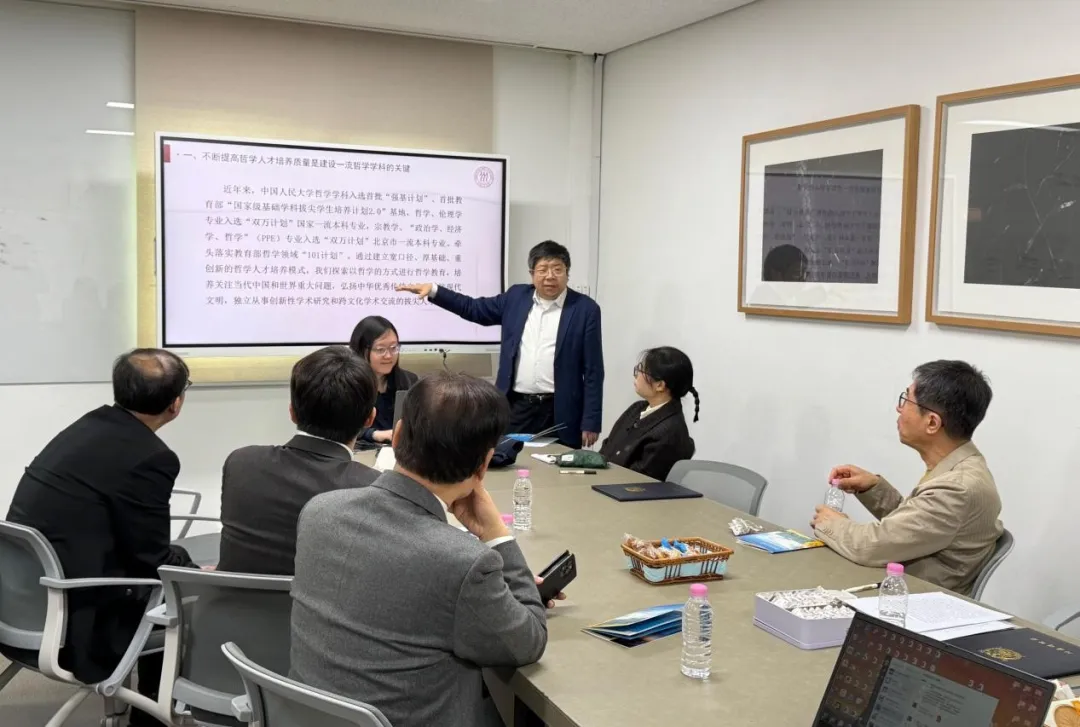
Dean Zang Fengyu delivered a presentation titled Explorations into Innovative Concepts for Cultivating Philosophical Talent, focusing on innovative initiatives in talent cultivation by the School of Philosophy at Renmin University of China. Professor Liu Zengguang addressed the theme of Contemporary Confucian Research and Education in Mainland China, highlighting recent advancements in Chinese Confucian research. Lecturer Liu Ying used her course East Asian Confucian Studies as a case study, shared pedagogical approaches to teaching Korean Confucianism in Chinese universities.
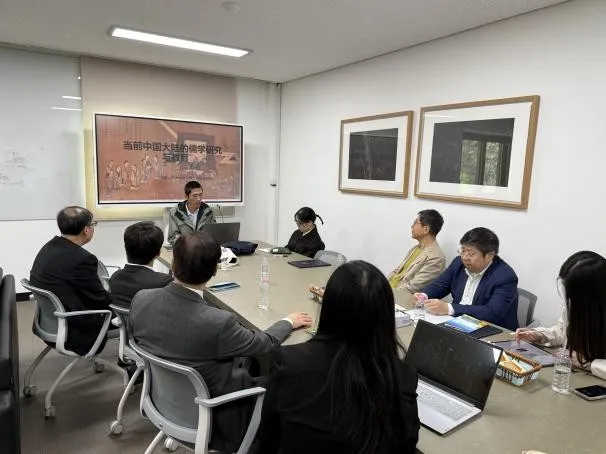
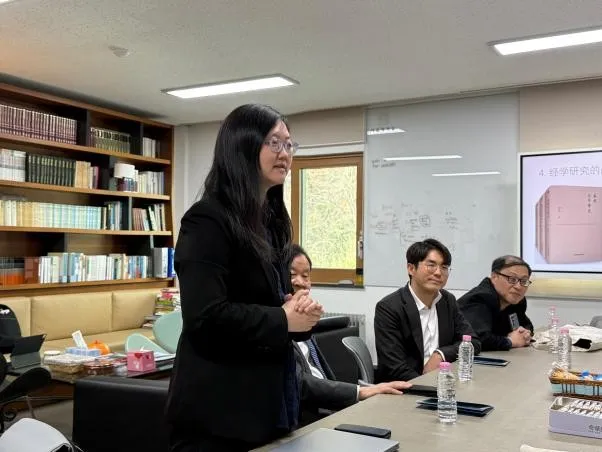
Dean Zang Fengyu respectively signed the Memorandum of Cooperation with Professor Jeong Weon-Jae, Director of the Department of the Philosophy,
Seoul National University, and Professor Chang Won-Tae , Director of the Institute of Philosophical Thought, Seoul National University.
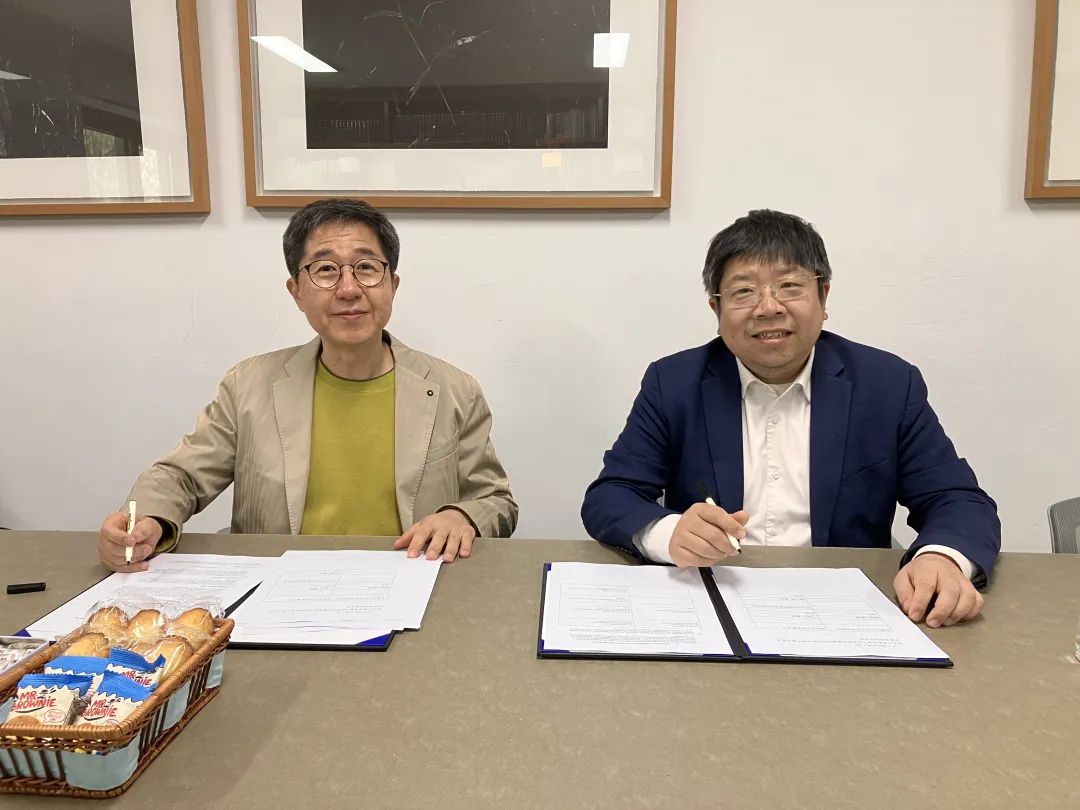
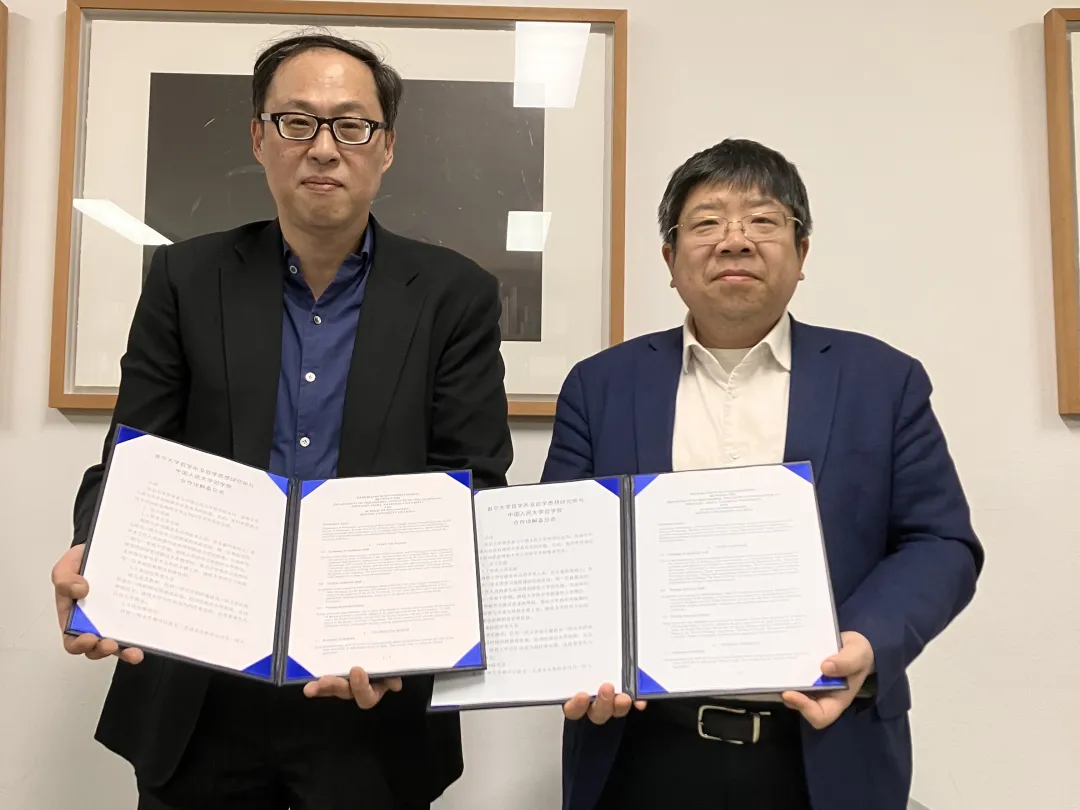
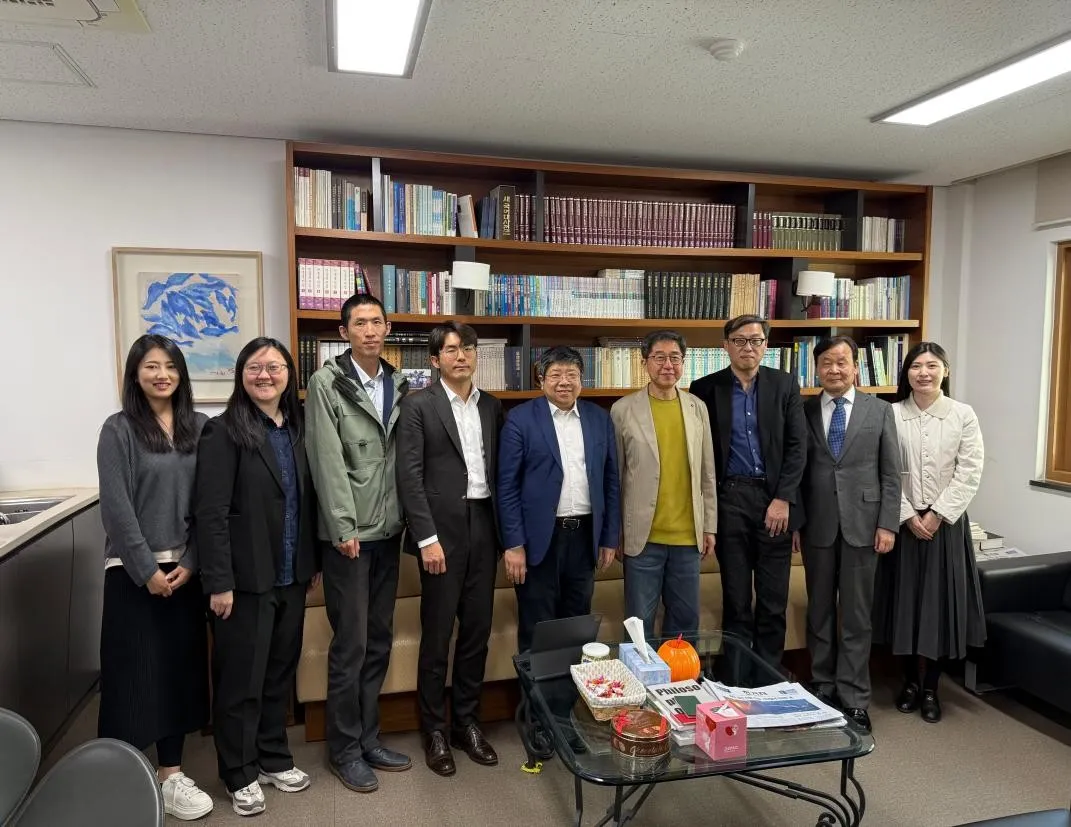
Director Jeong Weon-Jae, Director Chang Won-Tae, and other representatives accompanied the delegation from the School of Philosophy on a visit to the Kyujanggak Archives at Seoul National University. As an eminent cultural institution established during the Joseon Dynasty, the Kyujanggak Archives house an extensive collection of rare classical texts. Librarians provided introductions to such treasured works as the Veritable Records ofthe Joseon Dynasty (Joseon Wangjo Sillok), the Diaries of the Royal Secretariat(Seungjeongwon Ilgi),and Records of Daily Reflections(Ilseongnok), all preserved within the archives.
